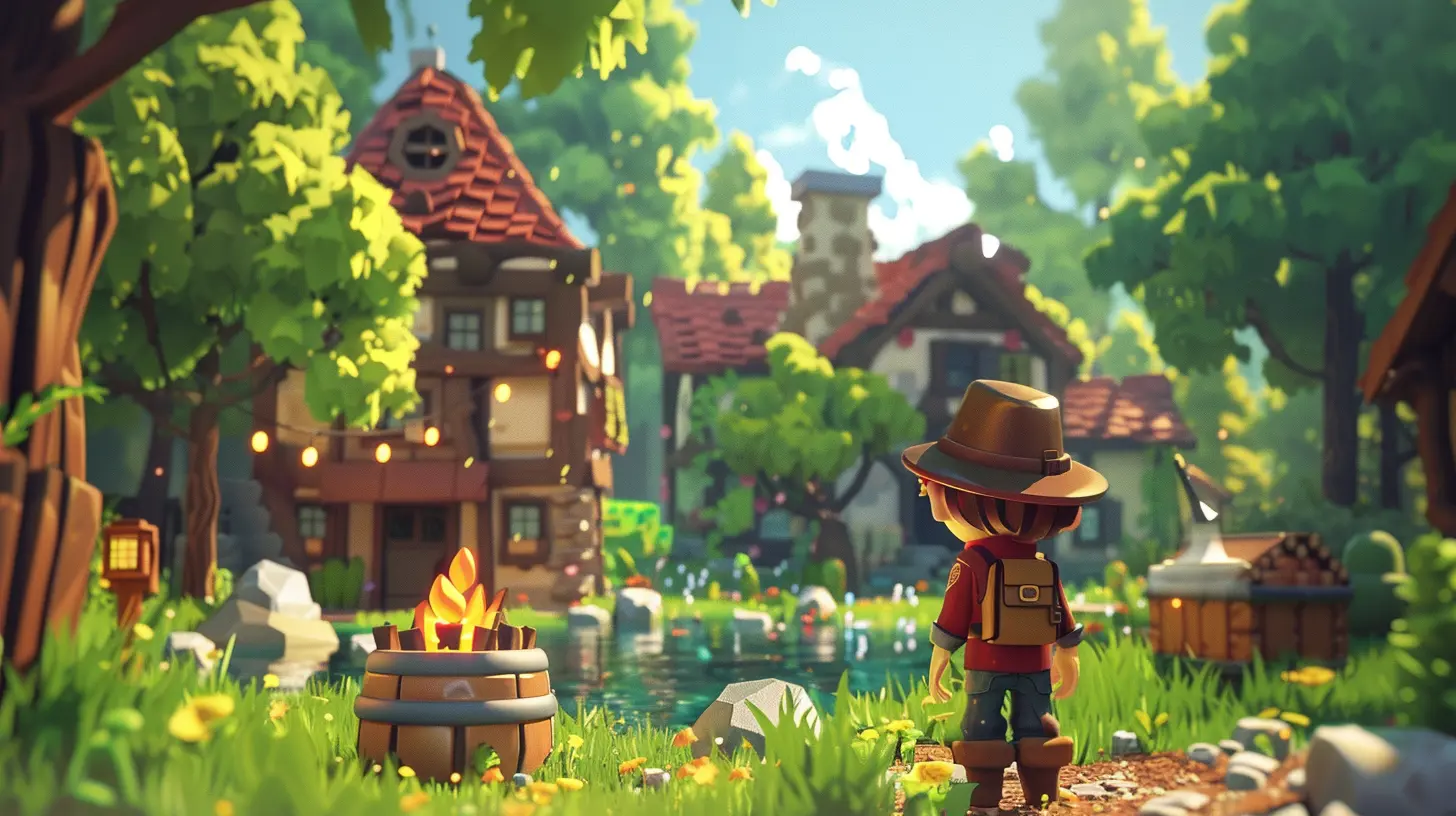Understanding Player Motivation: Designing Games That Hook
18 February 2025
If you've ever wondered why we can spend hours engrossed in certain games, you're not alone. What is it that makes some games utterly addictive while others fall flat? The secret sauce often lies in understanding player motivation. Designing games that hook is not just about stunning graphics or smooth mechanics—it’s about creating an emotional connection.
Let’s break down player motivations and how game developers can craft experiences that resonate with players on a whole new level. Whether you're a budding game developer, a curious gamer, or someone diving into the psychology of games, this guide will help you understand what really keeps players coming back for more.
Why Player Motivation Matters
Let’s face it: players are spoiled for choice. With thousands of games released each year, grabbing and holding a player’s attention has never been more challenging. This is where motivation comes into play.Think about it—why do people play games? Is it for the thrill of competition? The joy of exploration? The satisfaction of solving puzzles? Players are driven by different desires, and understanding those motivations is the key to creating experiences that stick.
When you tap into what players truly want, you’re not just creating a game—you’re crafting an experience. A space where they can escape, achieve goals, and feel accomplished. That’s where the magic happens.
The Core Types of Player Motivation
Player motivations can be grouped into several categories, but at their core, they revolve around psychological needs. If you’re unfamiliar with the concept, you can think of motivation as the why behind a player’s actions. What keeps them engaged? Here are some core motivators:1. Achievement and Mastery
Some players thrive on challenge and progress. They’re the ones who:- Grind endlessly to reach the highest levels.
- Perfect their gameplay to conquer the hardest bosses.
- Collect every possible achievement and trophy.
These players enjoy feeling competent and love the rush of overcoming difficult obstacles. For them, games like Dark Souls, League of Legends, and Stardew Valley offer engaging systems that cater to their desire for growth and mastery.
Designing for Achievement-Oriented Players
Design your game with a clear sense of progression. Challenge players with skill-based systems, leveling mechanics, or achievements that reward persistence. Your goal? Give them a reason to say, "Just one more try!"2. Social Interaction and Connection
Other players are all about relationships, competition, and collaboration. They log in to:- Build connections with friends.
- Work together in cooperative modes.
- Show off their skills in competitive play.
For these players, the social element is just as important as the game itself. Titles like Among Us, Fortnite, and World of Warcraft thrive on their ability to bring people together.
Designing for Social Players
Focus on multiplayer features, team-based gameplay, or in-game communication tools. Offer spaces where players can connect—whether it's through guilds, chat systems, or cooperative missions. A sense of community can make your game unforgettable.3. Immersion and Escapism
Some players want to dive into another world entirely. They crave games that:- Tell a captivating story.
- Offer a rich, immersive environment to explore.
- Present characters they can relate to or root for.
These are the players who get lost in games like The Witcher 3, Red Dead Redemption 2, or Animal Crossing. They’re not just playing—they’re living in these virtual worlds.
Designing for Immersive Players
Focus on creating a deep narrative, detailed world-building, or beautiful visuals. Immersion is all about texture—both literal and metaphorical. Let players feel like the heroes of their own story.4. Creativity and Self-Expression
For some, games are a canvas—a playground for creativity. These players thrive on freedom and love to:- Customize characters, homes, or vehicles.
- Build and design their own worlds.
- Tinker with systems and create unique experiences.
Titles like Minecraft, The Sims, and LittleBigPlanet are favorites for creative players who want to leave their personal mark.
Designing for Creative Players
Offer customization tools, sandbox mechanics, or modding support. Let players feel like co-creators of your world. Give them the tools, and they’ll turn your game into something entirely unique.5. Competition and Dominance
Then, there are players who live for the thrill of competition. For them, it’s all about:- Beating their opponents.
- Climbing to the top of the leaderboard.
- Proving they’re the best.
These players are often drawn to games like Call of Duty, Street Fighter, or FIFA—games where skill and strategy reign supreme.
Designing for Competitive Players
Focus on balanced mechanics, skill-based progression, and rewarding competitive play. Adding leaderboards, rankings, and tournaments can give these players the ultimate adrenaline rush.
Incorporating Motivation into Game Design
Now that you understand the core motivations, let’s talk about how to use them in your game design. It’s not just about choosing one motivation—it’s about blending them in ways that appeal to multiple audiences. Here’s how you can start:1. Know Your Target Audience
Before anything else, define who you’re designing for. Are you creating a casual puzzle game? A competitive shooter? A story-driven RPG? Each genre attracts players with different motivations.2. Offer Meaningful Choices
Players love feeling like their actions matter. Whether it’s story decisions, skill builds, or combat strategies, give them choices that have real consequences. This keeps them invested.3. Reward Effort Appropriately
Rewards are a great way to hook players—but they need to feel earned. Whether it’s loot, achievements, or narrative payoffs, make sure players feel like their effort is worth it.4. Balance Challenge and Accessibility
It’s a delicate line. You want your game to be challenging enough for mastery-seekers but not so punishing that casual players give up. Difficulty settings or adaptive AI can help strike this balance.
The Role of Feedback and Iteration
One crucial tip for game designers: Stay connected to your community. Pay attention to player feedback, data analytics, and engagement statistics. Often, your players will tell you (directly or indirectly) what motivates them to keep playing—or why they stop.Iteration is key. The best games didn’t launch as perfect products. Games like No Man’s Sky and Destiny 2 evolved dramatically post-launch because developers listened to their players and adjusted accordingly.
A Game That Hooks = A Game That Understands
In the end, designing games that hook is about understanding who your players are and what makes them tick. It’s about empathy—stepping into their shoes and creating something that satisfies their deepest drives.Games aren’t just entertainment. They’re a form of escapism, connection, and even self-expression. When you tap into those motivations, you're not just making games—you’re creating experiences that players will cherish for years to come. And if you do it right? You might just create the next big hit.
all images in this post were generated using AI tools
Category:
Video Game DesignAuthor:

Whitman Adams
Discussion
rate this article
9 comments
Stacey Estes
What an insightful read! Understanding player motivation is key to creating engaging experiences. Your exploration of design elements that captivate players is invaluable for both developers and enthusiasts alike. Keep up the great work!
April 5, 2025 at 3:44 PM

Whitman Adams
Thank you for your kind words! I'm glad you found the article insightful. Player motivation is indeed crucial for great game design!
Sylph Turner
Great article! It’s fascinating to see how understanding player motivation can profoundly impact game design. Your insights highlight the importance of connecting with players on a deeper level. I appreciate the thoughtful analysis and look forward to seeing how this shapes future gaming experiences!
March 23, 2025 at 5:32 PM

Whitman Adams
Thank you for your kind words! I'm glad you found the insights valuable. Excited to see how these concepts evolve in future games!
Vanta McGeehan
This article brilliantly highlights the importance of understanding player motivations in game design. By catering to intrinsic and extrinsic factors, developers can create engaging experiences that keep players returning, ensuring long-term success and satisfaction in the gaming community.
March 15, 2025 at 3:44 AM

Whitman Adams
Thank you for your insightful comment! Understanding player motivations is indeed crucial for creating engaging and lasting gaming experiences.
Mason Wheeler
Great insights! Understanding player motivation is key for engaging design. Excited to see how developers innovate based on these principles!
March 13, 2025 at 3:48 AM

Whitman Adams
Thank you! I'm glad you found the insights valuable. Exciting times ahead for game design!
Juniper Wheeler
Player motivation is the secret sauce; design mechanics that resonate to create addictive gameplay experiences!
March 8, 2025 at 6:09 PM

Whitman Adams
Absolutely! Understanding player motivation is key to crafting engaging mechanics that keep players coming back for more.
Kate McCarty
Great insights on player engagement strategies!
March 1, 2025 at 5:15 AM

Whitman Adams
Thank you! I'm glad you found the insights valuable.
Raelyn Green
Great insights on player motivation! Understanding these elements is key to crafting engaging gaming experiences.
February 27, 2025 at 6:06 PM

Whitman Adams
Thank you! I'm glad you found the insights valuable for creating engaging gaming experiences.
Teagan Myers
Crafting games that resonate with players requires deep understanding of their motivations and desires.
February 24, 2025 at 6:01 PM

Whitman Adams
Absolutely! Understanding player motivations is crucial for creating engaging experiences that truly resonate and keep players coming back.
Nathaniel Torres
Empower your game design by unlocking what truly motivates players—create experiences that inspire, connect, and engage!
February 18, 2025 at 5:22 AM

Whitman Adams
Thank you! Understanding player motivation is key to crafting engaging experiences. Let's inspire and connect with our audience through meaningful gameplay!
MORE POSTS

Which ISPs Work Best for Cloud Gaming?

How Lighting Effects Can Be Used Strategically in Games

How Game Remakes Tackle Outdated Content and Controversy

How Games Are Being Used in Mental Health Treatment Programs

Game Remakes That Surpassed the Originals

The Evolution of Combat Design in Modern Games

Crafting the Perfect Beta Testing Application